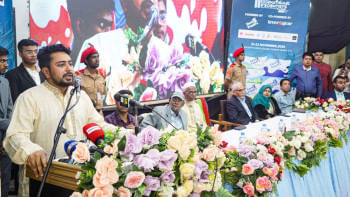Alpana Habib — “the happy homecook”

Almost four hundred prime-time television recipe shows.
Over 24,000 Likes on the Facebook page, 'Alpana Habibs Cooking Club.'
Two million views and a staggering 24 thousand subscribers to the official YouTube channel!
Figures suffice to illustrate Alpana Habib's achievements as one of the leading culinary specialists of Bangladesh, but to us Bengalis statistics are what they are…mere numbers!
Math is not our way of defining popularity. We also take into account emotion, love, passion and much more, before declaring a glass half-full or half empty.
We cannot deny numbers in this age and time but their onslaught in social media often gives a false impression. Alpana is unique in the manner that irrespective of which media one wishes to pick, Alpana Habib already stands tall, and her recent mammoth publication, Alpana's Cooking or Alpanar Ranna, simply adds a feather to the hat.
Alpana is a successful campaigner and a leader in the kitchen revolution; she has played an unmatched role in luring youngsters into the 'rannaghar.'
Being the realist that she is, Alpana opts to use multiple platforms to present herself and her honesty and dedication is evident. Those who have attended her cooking classes, or watched the popular TV shows will testify to her charm, and her unique fluency in disseminating of information.
The Bengali style of cooking has a legacy, which to rookies trying their hands in cooking in the initial phase may seem nightmarish. For decades Alpana has successfully re-represented these old recipes into newer, lucid terms for the laymen.
The bilingual recipe book, possibly a first as far as local publications are concerned, has detailed information on the use of ingredients, herbs, and spices in their exact portions to achieve best results. In this Alpana accredits her elder brother, Ashfaque Swapan — also the translator of the book in English.
She says, "the ease of reading and smooth flow of the text in this book is all his doing."
The concept of a bilingual publication was to reach and benefit a wider readership, and as far as the English version is concerned, the text is easy to follow even for the local fish, meat and vegetable recipes. Those who face difficulty in English will find the same ease in the effortless Bengali presentation.
A single 500-plus-page volume covers over 250 recipes both in English and Bengali, neatly divided into sections comprising salads; bhorta; staple Bengali cereal, local fish, meat, vegetable, and the ubiquitous daal.
Moving on to foreign influences she elaborately writes on biriyanis and touches up on East Asian cuisine, something we have picked up with much interested, and also Western cuisine — a rich cooking tradition that is now slowly making its way into our kitchen. Of course, to make matters complete there is a section of pickles and snacks, and to wind off — an ode to desserts!

One of the curious aspects of the book is the section on some of the basic cooking techniques, placed at the very end and quite rightfully so. Those who are seasoned cooks may find it redundant and can easily disregard and jump directly into any recipe they fancy.
However, this shall come immensely handy for the newbies.
It is widely acknowledged that sensations detected by the human brain while we eat are a combination of taste that our tongues detect, the smell and the texture of the food. These three senses of taste, smell and touch make the sensation of flavours complete. What most people miss are that garnishing, the plating and the way one decorates the table.
The brilliant food photography by Sohel Rana Ripon does full justice to the great recipes they complement.
When it comes to expressing heartfelt gratitude to the people who helped Alpana in her endeavour, the list is long as expected because every culinary journey needs company, experimental lab-rats, connoisseurs and critics, and even people who devour everything just to keep the cook on a high morale.
Alpana's Cooking is dedicated to Professor Siddika Kabir, and ProfessorAfzalunnisa, Kalpana's mother.
In her own words, Professor Kabir's legendary book — Ranna Khaddya Pushti, has been her bible. Alpana Habib's own effort — the classes, the shows, the YouTube channel and now the book — will certainly be the guide to a generation of rookies waiting to become seasoned cooks.
Metaphorically speaking she has already passed on the wooden spatula to thousands of youngsters who think — "this is fun!"
And the best thing about all of this is, she is not even half-way close to retiring.
Essentials —
Alpanar Ranna is published by Syed Ahsan Habib; the translation and editing has been done by Ashfaque Swapan. The well-illustrated, neatly bound 500 plus page book is well worth the Tk 2500 price tag.
The book is available at: The Bookworm Bookstore, Bengal Boi, Batighar, Aarong, Stardust, Bread & Beyond and Rokomari.com


 For all latest news, follow The Daily Star's Google News channel.
For all latest news, follow The Daily Star's Google News channel. 



Comments